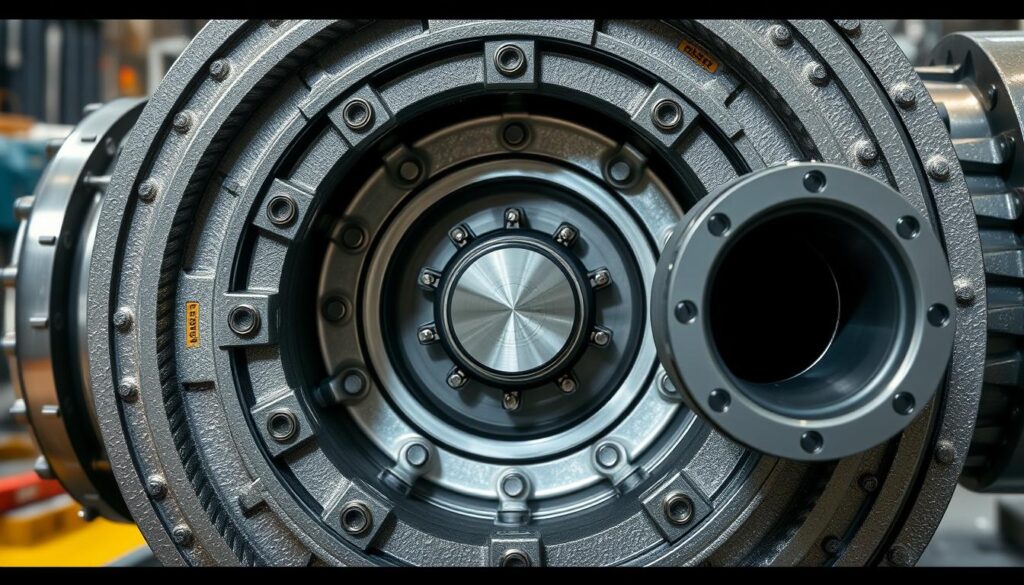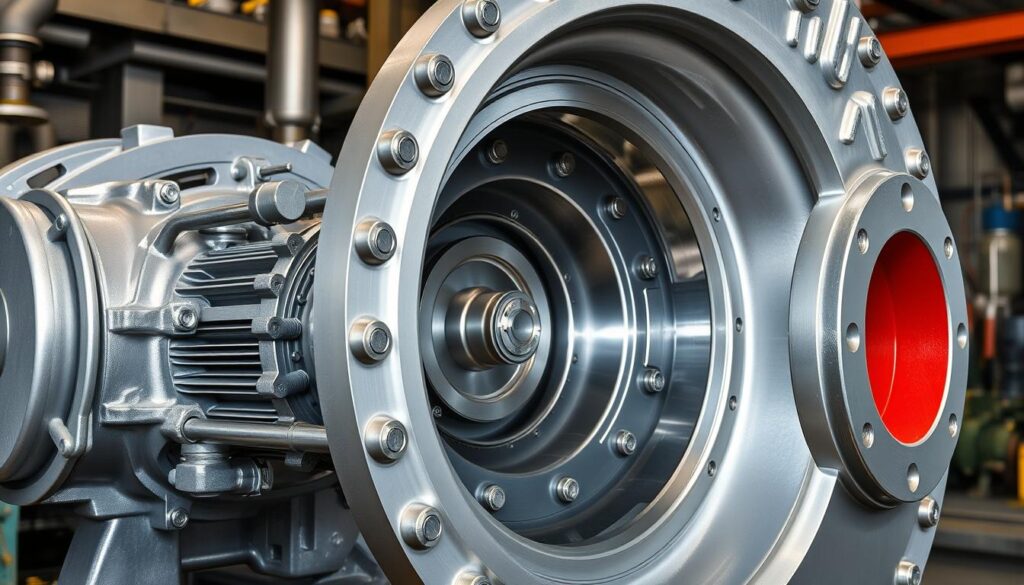Centrifugal pumps are widely utilized across various industrial sectors, from manufacturing to wastewater treatment. At the heart of these pumps lies a crucial component – the pump casing. This essential element plays a pivotal role in the operation and performance of centrifugal pumps. The pump casing provides structural support, protects internal components, directs fluid flow, and increases pressure, all of which are vital for optimizing pump efficiency and pump performance.
The pump casing is typically constructed from metal or alloy materials, and it houses the impeller, shaft, bearings, and other key parts. Understanding the function and significance of the pump casing is crucial for ensuring the reliable and efficient operation of centrifugal pumps in industrial applications.
Key Takeaways
- The pump casing is an essential component of centrifugal pumps, providing structural support, protecting internal parts, and directing fluid flow.
- The casing is typically made of metal or alloy materials and houses the impeller, shaft, bearings, and other key components.
- Understanding the function and significance of the pump casing is crucial for optimizing pump efficiency and performance in industrial applications.
- The casing design and materials play a critical role in the overall performance and reliability of centrifugal pumps.
- Proper maintenance and inspection of the pump casing are essential for maintaining the pump’s efficiency and longevity.
Understanding Centrifugal Pump Casings
The pump casing is more than just a simple housing; it plays a vital role in the overall operation of a centrifugal pump. The casing holds and supports the internal mechanical components, including the impeller, shaft, and bearings. It also directs the flow of the fluid, ensuring smooth and efficient passage through the pump. Importantly, the casing’s design can influence the casing pressure increase in the fluid, which is essential for various industrial applications.
Function and Significance
By understanding the function and significance of the pump casing, engineers and operators can optimize the performance and reliability of industrial centrifugal pumps. The casing’s design can impact the casing fluid flow and the overall casing design influence on the pump’s efficiency.
Role in Industrial Applications
Centrifugal pumps with their specialized casings are widely used across a variety of industries, including chemical industry, oil and gas, and water treatment. In the chemical industry, the casing design is crucial for handling corrosive or viscous fluids. In the oil and gas sector, API-standard casings are used for high-pressure and high-temperature applications. For water treatment and municipal water systems, the casing plays a key role in ensuring efficient and reliable fluid transfer. Regardless of the industry, the pump casing is an essential component that directly impacts the overall performance and durability of the centrifugal pump.
“The pump casing is more than just a simple housing; it plays a vital role in the overall operation of a centrifugal pump.”
Key Components of a Centrifugal Pump Casing
The centrifugal pump casing is a complex yet essential part of the pumping system, housing several critical components that work in harmony to ensure optimal performance. Two of the key elements within the casing are the impeller housing and the volute casing.
Impeller Housing
At the heart of the centrifugal pump lies the impeller, a crucial component responsible for generating the necessary centrifugal force to transfer kinetic energy to the fluid. The impeller housing is the structure that encases this impeller, guiding the fluid smoothly into and out of the impeller blades. The impeller design and impeller materials used play a significant role in the impeller function and overall pump efficiency.
Volute Casing
Another key component of the centrifugal pump casing is the volute casing. This casing surrounds the impeller and is designed to gradually slow down the fluid’s velocity as it exits the impeller. This reduction in velocity results in an increase in fluid casing pressure increase, which is essential for many industrial applications. The casing shape and casing fluid flow characteristics of the volute casing are critical factors in maximizing the pump’s efficiency and output.

“The impeller housing and volute casing work in tandem to ensure the smooth and efficient flow of fluids through the centrifugal pump.”
Centrifugal Pump Casing: Essential Design Considerations
Designing an efficient and reliable centrifugal pump casing requires careful attention to several key factors. From selecting the appropriate materials to ensuring proper alignment, each element plays a crucial role in the pump’s overall performance and longevity.
The choice of casing materials is paramount, as they must withstand the operating conditions, such as pressure, temperature, and potential corrosion. Metals and alloys are commonly utilized to provide the necessary structural integrity and resistance to the environment.
Calculating the casing wall thickness is also a critical design consideration. The wall thickness must be precisely determined to provide the required support and prevent deformation or failure under operational stress.
The casing split design is another important factor, as it allows for easy maintenance, inspection, and potential repairs. This feature enhances the accessibility and serviceability of the pump, reducing downtime and costs.
Incorporating wear rings into the casing design helps protect the interior surfaces from abrasive wear, extending the pump’s lifespan and ensuring consistent performance.
Proper casing alignment is essential to minimize vibrations, enhance efficiency, and prevent premature wear or failure of the pump components. Careful alignment during installation and routine checks are necessary to maintain optimal operation.
Finally, the casing must be designed with adequate drainage to prevent fluid buildup and potential issues, such as corrosion or operational disruptions.
By addressing these essential design considerations, engineers can create centrifugal pump casings that deliver reliable and efficient performance in a wide range of industrial applications.
“Optimizing the design of a centrifugal pump casing is crucial for ensuring its long-term performance and reliability in the field.”
Conclusion
The centrifugal pump casing is a fundamental component that directly influences the overall performance and efficiency of these critical industrial machines. By thoroughly understanding the function, significance, and key design considerations of the pump casing, engineers and operators can optimize the performance and reliability of centrifugal pumps across a wide range of industries, from chemical processing to water treatment.
From the impeller housing to the volute casing, each element of the pump casing plays a vital role in ensuring smooth fluid flow, increased pressure, and long-term durability. This makes the pump casing an essential part of any centrifugal pump system, as it directly impacts the centrifugal pump casing, pump performance, and pump efficiency in various industrial applications.
By focusing on the casing design and casing components, we can continue to enhance the capabilities of centrifugal pumps, driving advancements in process efficiency, energy savings, and overall system reliability. As we move forward, a deeper understanding of the pump casing will be crucial to unlocking the full potential of these indispensable industrial workhorses.
FAQ
What is the function and significance of the centrifugal pump casing?
The centrifugal pump casing provides structural support, protects internal components, directs fluid flow, and increases pressure. It is an essential component that plays a crucial role in the operation and performance of these pumps.
How do centrifugal pump casings differ across various industries?
Centrifugal pump casings are designed to handle specific industry requirements, such as corrosive or viscous fluids in the chemical industry, high-pressure and high-temperature applications in the oil and gas sector, and efficient fluid transfer in water treatment and municipal water systems.
What are the key components within the centrifugal pump casing?
The key components include the impeller housing, which houses the impeller and directs fluid flow, and the volute casing, which surrounds the impeller and gradually slows down the fluid’s velocity to increase pressure.
What are the essential design considerations for a centrifugal pump casing?
Key design considerations include the selection of suitable materials, wall thickness, casing split design, wear rings, casing alignment, and adequate drainage to ensure the casing can withstand operating conditions and optimize pump performance.


